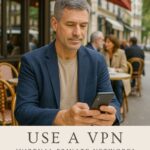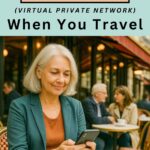
If you’re like most travelers, you probably spend a fair amount of time online when you’re on the road checking flight details, booking hotels, finding directions, uploading photos, or logging into your bank. But here’s the problem: every time you connect to Wi-Fi in a café, airport, or hotel, you’re stepping into a potential minefield for hackers and snoops.
That’s why using a VPN (Virtual Private Network) when you travel isn’t just a optional extra. It’s a simple, smart way to protect your personal information, keep your online activity private, and even make your travel experience smoother.
Here is one of our suggestions for the best VPN for traveling.
Here's why.
Table of Contents
Public Wi-Fi is Convenient…and Dangerous
It’s tempting to hop on any free Wi-Fi you find while traveling. Airports, hotels, train stations, and even city parks offer public Wi-Fi, and it feels like a gift when you’re in a foreign land without a local data plan. But open networks are notoriously insecure.
Anyone on the same network could, with minimal effort, intercept your connection and see what you’re doing Your logins, passwords, credit card info, even your email or cloud files are all visible to sophisticated hackers. This is called a “man-in-the-middle” attack, and it happens more often than you think.
When you connect through a VPN, your internet traffic is encrypted, meaning it’s scrambled into unreadable code. Even if someone manages to intercept your data, it’ll look like gibberish. So go ahead and check your bank balance or book a last-minute train ticket without worrying who’s watching.
Keep Your Personal and Financial Information Private
Seasoned travelers are used to thinking about pickpockets. But the truth is, online theft is more common—and harder to detect. Logging in to your email or financial accounts from a public network without protection is like leaving your passport or purse on a restaurant table.
With a VPN, your sensitive information stays private because all your data travels through a secure “tunnel” to a server that masks your identity. The websites you visit will only see the VPN server’s location, not your actual one.
This extra layer of anonymity helps prevent identity theft and protects your passwords, credit card numbers, and personal details from being collected or sold.
Avoid Regional Restrictions and Censorship
Have you ever tried to access your favorite news site or streaming service abroad, only to find it “unavailable in your region”? That’s because many websites restrict content by country. And many countries outright ban access to certain sites.
A VPN usually solves this problem by allowing you to choose a server location in your home country so you can browse as if you were still at home.
That means you can keep up with your hometown news, stream your favorite shows, or even access your U.S. banking or tax accounts safely, without being blocked by location filters.
In some countries, this isn’t just a matter of convenience. It’s about maintaining access to reliable information. Using a VPN can help you stay connected to trusted sources and familiar platforms when traveling in regions with heavy internet censorship.
Save Money on Flights and Accommodations
Here’s a little-known bit of travel info: airlines and booking sites sometimes show different prices based on your location.
Because your IP address (the online equivalent of your home address) gives away where you’re browsing from, you might see higher prices if you’re booking from a country with higher average incomes. That also happens often if the website detects you’ve checked the same route multiple times.
With a VPN, you can switch server locations and compare prices as if you were browsing from another country or region. This can sometimes reveal cheaper rates for the same flight, hotel, or rental car.
It’s not a guaranteed savings, but it’s a simple trick that can easily pay for your VPN subscription if it works just once.
Protect Your Digital Freedom
Even if you’re not worried about hackers or prices, think about privacy on a broader level. Without a VPN, your internet provider—and sometimes even the local government—can monitor your online activity.
When you use a VPN, you take back control of your digital footprint. Your data stays between you and the sites you choose to visit.
VPNs Are Easier to Use Than Ever
If you’re thinking, “this all sounds complicated,” don’t worry. Modern VPNs are designed for travelers, not techies.
You simply download an app, sign in, and tap one button to connect. Most VPNs automatically choose the fastest, most secure server available, so you barely notice a difference in speed.
For frequent travelers, look for a VPN that offers:
- Automatic connection on public Wi-Fi
- Multiple device support (for laptop, phone, and tablet)
- Servers in dozens of countries
- Strong encryption and a no-logs policy (meaning they don’t store your data)
Reputable VPN providers like Mozilla, Mullvad, or Surfshark offer travel-friendly plans and 24/7 support.
Peace of Mind on the Road
Most important, using a VPN while traveling is about peace of mind. You don’t need to understand all the technical details to appreciate the benefit of knowing your personal information is safe.
When you’re in an unfamiliar place, the last thing you want is to deal with a hacked account or compromised credit card. A VPN is a small, affordable precaution that keeps your digital life secure—so you can focus on enjoying the journey.
Final Thoughts
We’ve always recommended that the best adventures come after being thoroughly prepared. We pack light, we count our medications, we make copies of our passports, and we buy travel insurance.
Using a VPN belongs in that same category of smart travel habits. It’s inexpensive, easy, and can save you from serious headaches later.
So before your next trip, take five minutes to download a VPN app and set it up on all your devices. Then, when you log onto that café Wi-Fi in Paris or that hotel network in Bangkok, you scroll with confidence—knowing your connection is secure.
Up Your Travel Skills
Looking to book your next trip? Use these resources that are tried and tested by us. First, to get our best travel tips, sign up for our email newsletter. Then, be sure to start your reading with our Resources Page where we highlight all the great travel companies and products that we trust. Travel Accessories: Check out our list of all the accessories we carry to make getting there and being there a lot easier. Credit Cards: See our detailed post on how to choose the right travel rewards credit card for you. Flights: Start finding the very best flight deals by subscribing to Thrifty Traveler. Book your Hotel: Find the best prices on hotels with Booking.com. See all of the gear and books we like in one place on our Amazon shop.Got a comment on this post? Join the conversation on Facebook, Instagram, or Threads and share your thoughts!



